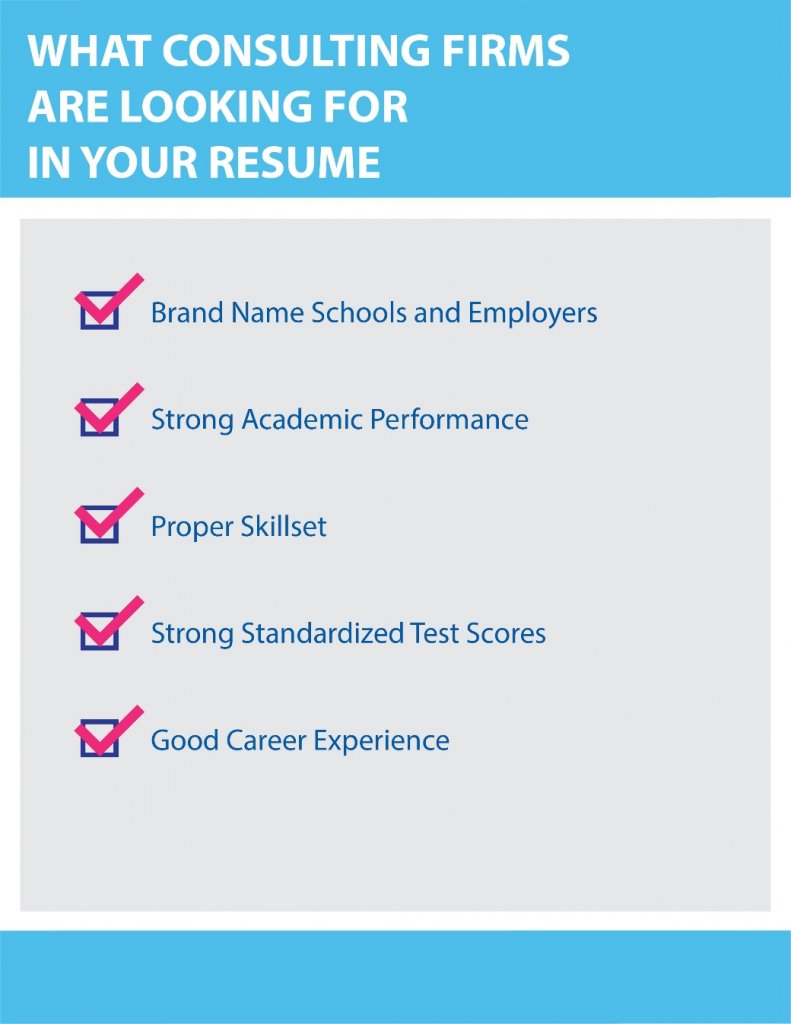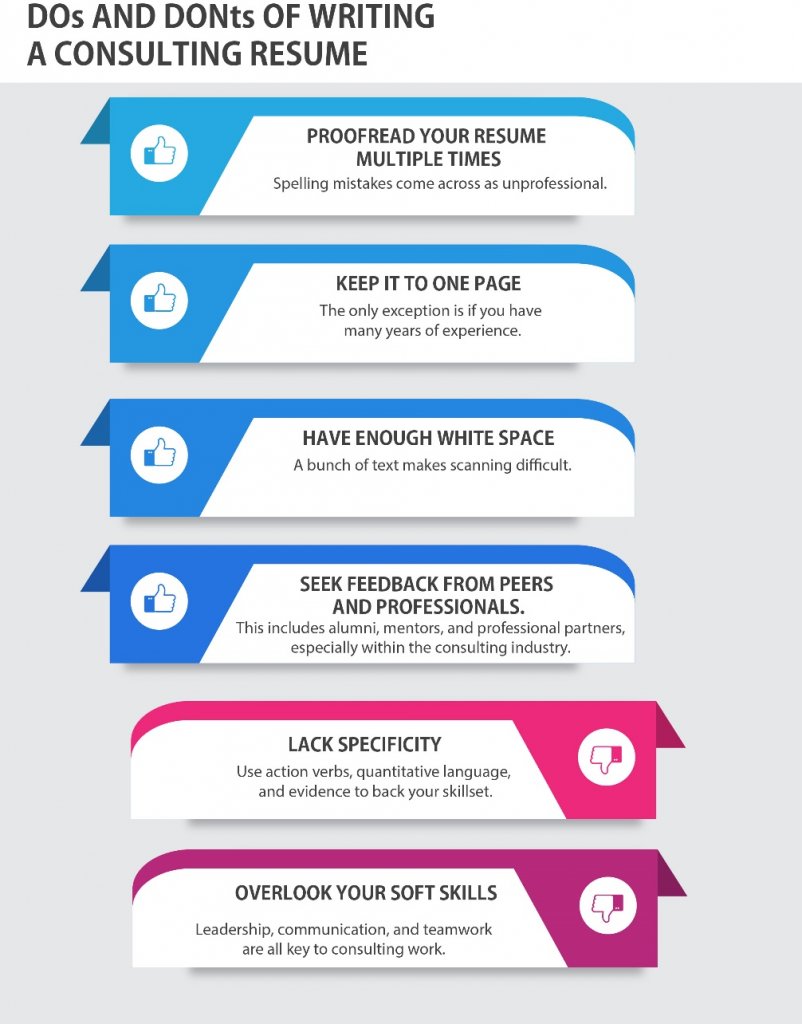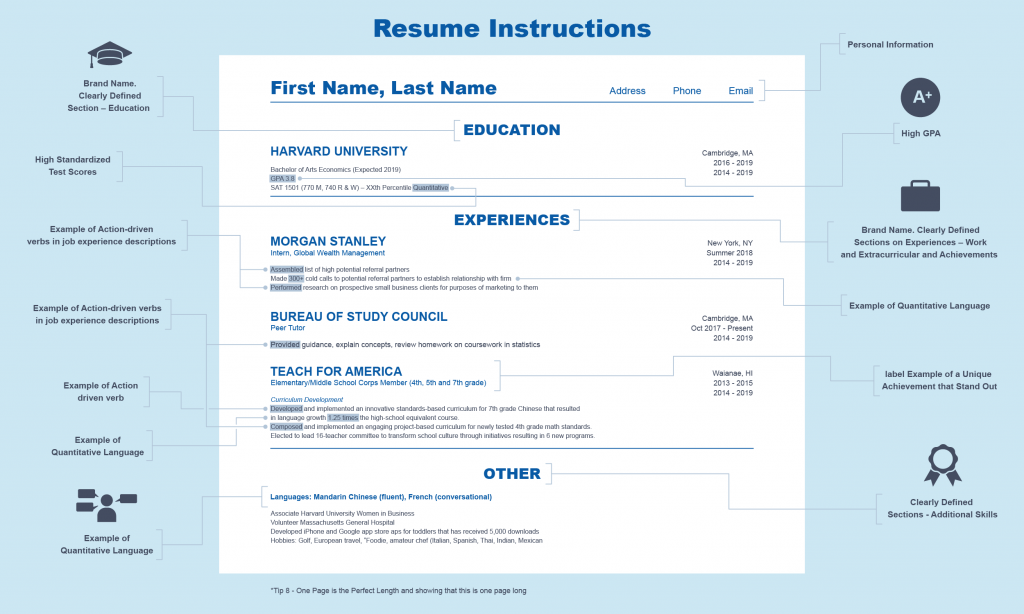For almost any professional job, applicants are required to provide a resume and cover letter to demonstrate their qualifications. Your resume is one of the most important documents during the application process, as it acts as a summary of your education, experience, and skillset.
In the consulting world, your resume is even more important. The top three consulting firms — McKinsey, Bain, and BCG — have acceptance rates of less than five percent during any given year. The resume screening step is where most applicants are eliminated. This goes to show just how important it is to write a strong consulting resume when applying to be a consultant.
FREE Resume Tips Email and Video Series
This form collects your name and email so that we can add you to our email list that delivers the free resources you are requesting. Check out our privacy policy for details on how we protect and manage your submitted data.
We’ll never spam you or share your email. Unsubscribe at any time.
A management consulting resume is different from your standard resume. The difference is not just in terms of format, but content, style, and overall approach. You probably know that the role of a consultant encompasses many different skillsets. A management consultant is a problem-solver, a data expert, and a communications professional, all bundled into one. Because consultants handle complex tasks using many different approaches, firms will be looking at your resume to determine if you have what it takes to be a successful hire. So, what goes into writing the perfect consulting resume? This piece will cover four essential guidelines that you should follow when preparing your resume for a consulting opportunity. By following these steps, you will be in a much better position to impress your employer and secure an interview.
1. Understand What Consulting Firms Are Looking for in Your Resume
In order to write a resume that will get you the interview, you must understand what top consulting firms look for when reviewing candidate applications.

These top firms care less about the proper format than they do about the qualifications and accomplishments that each candidate has. During resume screening, top consulting firms will pay attention to the following components of your resume:
- Brand Name Schools and Employers
The truth is that top consulting firms do care about which schools you attended and which employers you’ve worked for. They have a strong bias for brand name schools and employers that stand out to them and their clients. In fact, it’s the attention that the clients of the firm give to brand name schools that cause the interviewer to pay the same attention to your education background.
It’s not uncommon for a client seeking consulting services to be charged over $500,000 a year. As you would expect, such clients would want to ensure that any consultants working on their project are adequately qualified. Boasting a BS from Yale or an MBA from Harvard certainly adds points, even as a junior consultant working on a major project.
This doesn’t mean that you can’t get a consulting position if you went to a non-target school. However, if you have such brand names on your resume, make it easy for people to see.
- Academic Performance
Consulting firms also pay attention to academic performance. They want to know how you rank in your class and whether you have what it takes to tackle complex consulting projects. Therefore, include your GPA to differentiate your resume from others.
MBA applicants should include their GMAT scores and MBA GPA to be easily seen on their resume.
- Specific Skills Relevant to the Profession
Top consulting firms want to know that you have soft skills, including leadership and communication. While working in the profession, you will need to be able to handle difficult personalities, lead a team, and communicate important information in a manner that people can easily understand. Therefore, make sure you list experiences that demonstrate any leadership and communication experience, among other essential skills.
Activities that demonstrate such skills include job and internship responsibilities, extracurricular activities, and specific experiences that speak to these skills.
- Standardized Test Scores (Especially in Math)
Because grading can vary from one institution to another, top consulting firms would like to see your performance in standardized testing. High performance further strengthens your academic qualifications and shows consulting firms that you have what it takes to be a successful hire. Make sure you include high SATs, GRE, GMAT, MCAT, or LSAT scores in your resume.
- Career Experiences
Consulting firms want to see your career experiences, accompanied by what you achieved during your time in each position. Remember that these firms compare how long your career was with how much you achieved. You may need to show more accomplishments after working for eight years compared to one year.
Regardless of the number of years in a position, follow an achievement-based approach when describing your job. This means emphasizing outcomes, quantifying them, and highlighting parts of your job that apply most specifically to the consulting position in question
2. Properly Format Your Resume
Knowing what top consulting firms expect from your resume, is just the beginning of resume writing. While it does form a solid foundation to build upon, you should also know how to present your academic, professional, and extracurricular skills in a consulting resume.
A lot of this comes down to proper formatting. And by formatting, I don’t mean margins, font size, and columns. Rather, proper formatting refers to presenting your qualifications in a manner that the resume screener can easily identify.
Here are key points to remember when formatting your resume.
- Emphasize Brand Names
Make sure the brand name schools you attended, or big companies that you interned with, are clearly mentioned near the top of your resume. Have them in a bold font right after the name and contact information section.
- Proudly Display a High GPA
Along with brand names, include your high GPA right next to the school and program information. Remember that resume screeners are doing just that: screening your resume. If you make your distinguishing qualifications hard to find, you may be overlooked.
- One Page Does the Trick
This is perhaps the biggest caveat to consulting resume writing. How do you condense so many experiences and qualifications into just one page?
Starting early is key. Take time to reflect on your most relevant experiences, how you’ll allocate bullet points, and how you can play around with margins and line spacing to fit everything on one page. While this may sound challenging, it’s possible — unless you have many years of experience across multiple fields (which you can extend to a second page).
- Have Clearly Defined Sections
A typical consulting resume should be split into five clearly defined sections:
- Personal Information
- Education
- Work Experience
- Extracurricular Experiences and Achievements
- Additional Skills
While you don’t have to follow this format religiously, make sure the information you include covers all sections mentioned above. More importantly, don’t forget about your extracurricular achievements. This section gives you the opportunity to demonstrate important skills such as leadership, teamwork, and entrepreneurship.
- Use Action-Driven Verbs
When your resume is being screened, you have only seconds to attract the attention of your resume screener. So, it is essential that you give some thought to word choice. Start each bullet point with an action verb such as “lead,”“initiated,”“solved,”“saved,” etc. This will attract attention to your specific achievements and make you stand out from other applicants.
- Emphasize Language Skills
If you can speak multiple languages, you may stand out to consulting firms. A firm may view you as an asset for a specific market they’re targeting. Because consultancy is becoming global in today’s world, being fluent in more than one language can set you apart from other applicants.
- Keep It Simple
Remember that not all resume screeners are familiar with your specific field of work. Therefore, avoid industry-specific jargon when describing your accomplishments. Simplify this information in a manner that anyone can easily understand when reading through your resume.
- Demonstrate a Variety of Skills
Avoid falling victim to writing an incomplete resume. How could this happen? If you’ve been working as an engineer for many different companies, don’t include the same job responsibilities repeatedly throughout your resume. Instead, highlight unique experiences that demonstrate your diverse skillset. More importantly, emphasize your achievements rather than your daily responsibilities.
- Use Quantitative Language
The consulting field is driven by data. Numbers, quantities, and other similar information can attract attention to your skillset. As you outline achievements in your professional career, present them using quantified data backed by numbers.
For example, you could state how you developed a quality management system that resulted in lower production costs, from $40 per unit to $30 per unit (or something similar).
3. Stand Out from the Crowd
As you write a consulting resume, remember that you’re looking for any opportunity to stand out from thousands of other applicants. Similarly, resume screeners are looking for what makes you different.
Personal accomplishments such as distinguished scholarships, Olympic medals, or presidential honors can be the accomplishment that sets you apart from another similarly qualified candidate.
If you’ve done smaller, yet unique activities that others haven’t done, also include these in your resume. The goal is to take every opportunity to stand out from the competition.
4. Avoid Making Simple Mistakes
As you finalize your consulting resume, make sure you keep the following Dos and Don’ts in mind. These pointers can help you avoid common, easy-to-prevent mistakes so that you can submit an outstanding resume.
- DO: Proofread your resume multiple times.Spelling mistakes come across as unprofessional.
- DO: Keep it to one page. The only exception is if you have many years of experience.
- DO: Have enough white space.A bunch of text makes scanning difficult.
- DO: Seek feedback from peers and professionals.This includes alumni, mentors, and professional partners, especially within the consulting industry.
- DON’T: Lack specificity.Use action verbs, quantitative language, and evidence to back your skillset.
- DON’T: Overlook your soft skills.Leadership, communication, and teamwork are all key to consulting work.

As you can see from these tips, writing a consulting resume is different from a standard resume for other types of jobs. A consulting resume requires attention to detail, focus on your unique skillset, succinct language, and an achievement-based approach. Writing the perfect consulting resume is not as easy as many people think. It takes lots of time and attention.
Resume Example
Here is an example resume that highlights the tips I’ve mentioned. Reference this example as you create your resume to make sure that you hit all of the important sections. With the exception of your brand name schools/employers and GPA, these items do not need to appear in the order I have them listed. But, make sure that they are all represented in your resume.
Below is an example consulting resume. You can also download the example by clicking here.

More Resources:
FREE Resume Tips Email and Video Series
This form collects your name and email so that we can add you to our email list that delivers the free resources you are requesting. Check out our privacy policy for details on how we protect and manager your submitted data.
We’ll never spam you or share your email. Unsubscribe at any time.




127 thoughts on “Consulting Resume – The Ultimate Guide on How to Write the Perfect Consulting Resume”
Victor,
Hello, I was recently accepted to the No. 15 US News Business School (UT-Austin) for the Part-Time program. I have 4 years work experience, a 3.3 Undergrad GPA in Aerospace Engineering (Texas A&M), currently work as a Software Engineer at Dell, and a 670 GMAT (44Q, 38V). I’ve taken the GMAT once before and scored a 560 (33Q, 34V), but this time, I really studied hard for the GMAT (Manhattan GMAT).
I really want to enter the world of management consulting at one of the Big 4 (not MBB, but Deloitte, PwC, KPMG or E&Y), and plan to supplement my low GMAT with extracurricular activities (Graduate Consulting Club), networking, and planning to switch career trajectories in about a year to a hybrid engineering-finance role at Dell before I graduate. Should I retake GMAT given my profile?? It’s been weighing heavily on my mind..
Thanks in advance!
Leyton,
For MBB you really need over 700 on the GMAT. Since your goal is Big4, you’re probably in the range at 670. Whether or not to retake it depends on your opportunity cost and likelihood of improving the score by a significant enough amount to warrant the effort. My sense is retaking the GMAT is probably not a high return on investment activity especially since you said you already studied hard for it. Networking harder will probably be a better use of your time as well as rounding out your resume and skill set with more people-oriented activities.
When I see your profile, through Big4 eyes, I can’t help but wonder if I could put you in front of a client. If a client says you are wrong and does so in an aggressive or slightly combative way, will you be able to confidently and respectfully disagree and persuade the client otherwise?
If a group of junior clients on your team are bickering, do you have skills to smooth out the situation?
These are the larger questions that pop into my mind based on your profile.
Victor
Victor,
I am currently an architecture student at one of the top ranked public schools in the US. I have recently come across the consulting industry, and, after a lot of research and thought, I have decided that consulting is an industry I would like to go into after graduation.
I am wondering what I can do to be able to prepare myself so that my resume is attractive to the Big 3 so that I can secure an interview.
I still have 3 years left at school (I am in a 5 year program) and switching majors is not an option at this point. I have a 3.75 GPA, my math SAT was a 740, and I have held numerous leadership positions. I am currently the president of the School of Architecture council, and I represent our college at the University-wide level. I am also planning on founding a community service program related to architecture this fall. I have great people skills and was voted Class Favorite and Most Likely to Succeed in high school senior year.
What can I do to become more appealing to consulting firm recruits? I have no business background and I am afraid this will hurt me. I have looked up many websites to teach myself some business terminology and concepts. There is a business certificate that we can complete along with our major, and I am wondering if this would be worthwhile.
Thank you so much, I look forward to hearing back from you.
-Alena
Alena,
If your university has a business school or campus clubs than span schools within the university, consider jointing some business or entrepreneurship oriented ones. Yes it hurts you to not have some indication of interest in business in your background. Certificates carry very little weight generally.
The issue is two fold: 1) looking like you have interest in a business career, and 2) actually understanding basic business concepts. The first helps you get the interview, the latter to pass it. You can’t be googling every term you here in an interview. It’s just not practical.
For the former, consider business oriented activities. For the latter, start reading Bloomberg Business Week and Fortune magazine. The first for short news articles, that latter for indepth profile articles that go into depth about the issues of specific companies. Google any terms or concepts you do not understand.
Other options. Take an intro to economics class as an elective, maybe a financial analysis class… Both to add to your knowledge and to indicate interest. Many free classes online on these topics as well.
Victor
Dear Victor,
How would a MPP or a MA in Regional Studies from Harvard compare to MBA graduates if I am going into consulting after a number of years in government service from a country other than the US? (You mentioned earlier that HBS on resume will likely cause other factors to be forgotten, I assume other Harvard degrees are less prestigious?)
Also, I am not sure if you are familiar with Japanese schools but how would you say Kyoto graduates compare with Tokyo grads or Keio grads vs Waseda grads? Are they on par on the prestige factor or are there differences?
Sincerely,
Hayley
Hayley,
The MPP ore regional studies from Harvard is less prestigious than the bschool. It also depends what country and office you apply to. If you apply for the Boston office, you have no differentiation. If you apply for the Moscow office, any Harvard is better than no Harvard.
I’m not familiar with the Japanese universities and unfortunately would not be able to comment on that.
Victor
Hi Victor,
Thanks so much for your helpful article! I just have a question after reading it:
I’m a Stanford undergrad and have the great brand name, so now I’m wondering how to differentiate myself in my extracurriculars. What sorts of extracurriculars do you think would be impressive? I’m currently a chair in student council and am team lead in the Business Association of Stanford Entrepreneurial Students. Are there other areas you’d recommend I get involved in?
I’ve also competitively played the piano in high school (performed at Carnegie Hall and won other awards), but I stopped playing in college because I thought that student council and other leadership might be more relevant to consulting recruiting, and that continued involvement with piano might not be as important for consulting. Is this true?
Thank you so much!
Sunny
Sunny,
I think you are somewhat asking the wrong question. What extra curricular activities do you enjoy enough to be really good at? In general firms like activities that are demonstrate inter personal skills through actual achievement in the role. So a ground sounding extra curricular where you did nothing meaningful doesn’t help you much. If you landed a bunch of great extra curricular titles, but didn’t actually have to interact with anyone in those roles, it will be very obvious at the interview that your inter personal skills seem inconsistent with the interpersonal skills your resume would imply.
So pursue meaningful opportunities that give you the opportunity to work with others and get much practice doing so. It’s important to BE good, not just LOOK good.
Also to me it is impressive you played at Carnegie Hall. It’s different. Is it directly relevant to consulting? No. Does it stand out as different? Yes. Consulting firms like people who can achieve things that are hard for the general public to achieve. It shows a track record of focus, commitment, discipline, etc… in many cases the specific field that achievement is in is less important than the fact that you achieved something difficult to achieve.
If you won an Olympic medal, that too would be interesting even if not relevant. The hard part in the resume screening part of the process (see my consulting resume toolkit for more specific details and actual resume examples) is you need something that sticks out as different from the crowd.
When I was at Stanford, 400 undegrads applied. My guess is 40 or so got 1st round interviews, 6 got offers. Keep in mind many of the 400 didn’t even know what a case interview was.
My extra curriculars were being the Photo Editor of the Daily and later the yearbook. Hardly directly relevant to consulting, but it was what was interesting to me at the time, I worked 30 hours a week at it, and got to cover some breaking news events (riots/protests, vice presidential candidate announcements, etc..).
The range of who gets interviews can be quite wide. Try not to over think it and to game the system. Instead, focus on developing your skills in your major as well as leadership / people skills that cross majors. Also it doesn’t hurt to do what you enjoy if it means you will put more effort into it and developed greater competence at it.
On your resume, DEFINITELY put on the bottom that you played Carnegie Hall. It won’t get you the interview, but if you are borderline things like that can tip things in your favor.
Good luck,
-Victor
Hi Victor,
Your article is very helpful. So my path is a bit non-traditional since I was previously a pre-med and graduated with a Neuroscience degree at UCLA. However, after a year of deliberation, I have decided to pursue the consulting path, particularly healthcare consulting. I did get an 800 in the math portion of the SAT’s and my quantitative skills have always been very strong but I do not have much coursework at UCLA that further demonstrates that. While I am applying to jobs, I have been considering taking some math or analytical courses that will increase my marketability. Do you have any thoughts or suggestions about my approach? All of this is very new to me but your website has been a huge help!
Thanks so much and looking forward to your response,
Shiv
Shiv,
From a consulting firms point of view, if you got an 800 on the math SAT and presuming your in major gpa in a hard science was pretty good, it’s safe to say you can add, subtract, multiply, divide and calculate a percentage. (Truly that is 95% of the math used in consulting).
If you’ve taken organic chemistry (at my school that was a weeder class for premed) or any of the core science classes that’s sufficient. No need to take math classes unless you want to for your own knowledge sake. If you were going to take more for you own benefit, I would recommend an intro statistics class and an intro economics class — both quite useful even outside of consulting.
Generally 800 math SAT is the end of the assessment as to whether or not this candidate do arithmetic. (at least at the resume screening portion of the process).
If I were screening your resume, I would presume you could do math. I would be curious to see your gpa in neuroscience. Did you excel or did you just get by? UCLA may not be a target school for most firms, so to be considered it would really help if you had a very high gpa from ucla — 3.9 or above ideally.
So the lack of ivy is a bigger constraint for your background than lack of a math class on your transcript. Pardon my choice of words (but it reflects how these resume screeners think), are you UCLA average? or are you UCLA exceptional? The former probably not going to get an interview, the latter is a definite possibility.
At the ivy’s the presumption is the talent pool is a higher caliber, so the firms will go lower on the gpa scale. So a 3.5 Harvard is equal if not better than a 3.9 UCLA (as an illustrative example).
A 4.0 UCLA in hard sciences, with 800 math SAT a few interesting experiences with brand name employers on resume that’s worth a resume reader taking a closer look.
-Victor
Victor,
First of all, I really appreciate everything you put on the website. All of it is very useful and immensely informative.
I d0 have one question that I am curious about.
My resume lists all of the things you listed above: A high GPA while committing over 40 hours a week to coaching/volunteering with various organizations. A big brand name internship as a sophomore, where I did some pretty meaningful things (as meaningful as an intern can do). Plenty of leadership/team experience. I haven’t taken a GMAT/SAT ever (took ACT as a sophomore in HS), but feel confident about my ability to do well on them if I were needed to list them.
However, I go to The Ohio State University, which is not exactly prestigious (although it is climbing up the rankings every year… Go Bucks!). What’s the likelihood that my resume hits the trash folder because of the name of the school at the top? Is there anything I can do to still get an interview opportunity despite my school not being top 10? Lots of networking, I presume?
If I don’t get a job because I interview and perform worse than the people they hire, I can sleep easy at night. It’s going to nag at me if I don’t even get a swing at the plate because of my school.
Anything you’ve got would really be appreciated.
Thanks Victor,
Nicholas
Nicholas,
Your assessment of the situation is fairly accurate. There is a huge bias against non target schools. Networking is the key and also targeting in your case offices based in Ohio. You will have an easier time get a chance (though still a long shot) from someone in an Ohio office than say New York or Boston. Other than, anticipate getting an informal case interview by phone or over coffee (unannounced) to determine if someone you meet wants to risk their reputation by recommending you for a real interview. You have to nail the case in the interview for the interview. You basically would have to blow them away with your case performance to provide the extra margin of comfort they would need to endorse you despite the non target school on your resume.
Victor
Muk,
I think most people are somewhat split on this decision. I personally see the resume as a marketing document. Everything on there should be accurate, but I personally think it is fine to exclude things that aren’t relevant.
For example, I do some volunteer work at my kids school. I helped them remove weeds from the garden next to the playground. One could argue it is a “job”. But it isn’t relevant to my reader.
Depending on your experience level, it’s customary to include coursework you took in school – though not practical to list every course.
That’s my personal take. Again, a number of people will disagree with this point of view.
Victor
Muk,
You should make your own decision on this based on what you are comfortable with.
Victor
Hi Victor,
If I’ve had a total of 6-7 experiences (including pre-undergrad full time work and college internships). Is it necessary to include everything in my resume? An interviewer (non-US, non-top 50) brought it up during an interview and said I should, even if it means exceeding the recommended 1 page length.
Also, say I am working for a startup that isn’t doing that great and so decide to take another job (while still working for the startup), do I need to mention both as my current experience in my resume?
What I am trying to understand is if a resume is indeed just a marketing document where you provide only the most relavent information or if its mandatory to list every position you’ve ever held. Just for full disclosure, I always mention all my work experiences during the interview process itself (I am not really trying to hide anything).
Thanks a ton. Really appreciate the help.
Hi Victor, I have been working in science research / project management for several years, but am now looking to switch into MC. Do you have any advice on additional ways to enhance my resume and training prior to applying? My education background includes a Masters (science) from Cambridge. I have also previously started an entrepreneur business venture.
Vector:
I am an undergraduate student at the University of Minnesota majoring in B.S Economics. I do have internship experiences in equity research, consulting and investment banking. My current GPA is 3.5.
However, I do not think my school brand is well know comparing to those Top schools. Also, two of the internship experiences that I had is from China which I think it’s not a big brand for US employer. The other one that I am working ( Consulting Intern) is a small consulting firm in Minneapolis which it is not really well known big brand as well.
My question is:
1.Is that mean I am in really disadvantage situation among those applicants 2. Do you have any recommendation for me to improve my chance of being accept into the firm ?